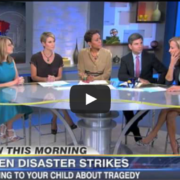Talking to Kids When Bad Things Happen: MH17 Plane Downed
When flight MH17 was downed between Amsterdam and Malaysia, Good Morning America asked me to come in and discuss it. In particular, how do you talk to children and teens when bad things, like this plane crash, happen?
1. We live in social media world. There are going to be all kinds of graphic and upsetting images on Twitter and Facebook. What should you do about teens who may be exposed to disturbing visuals?
While it’s easy to turn off with younger kids, with teens, you can’t just turn off the TV and hope they don’t see anything. There are images and access to news stories everywhere. So tell your teen, “you may be curious and you may seek out or receive images or information that make you feel concern or bring up questions in your mind. I would like you to come to me about any questions you have and then we can go to the credible news stations and get the most accurate story.” You may not be able to control the media but you may be able to control how your teens absorb the information. Helping teens to become more media literate will help them to better deal with our world today.
2. What about younger kids? What should you say to a child who may have heard something upsetting?
With younger children, think through 3 things.
- First, your words. They should underscore safety and let them know the adults in charge are doing everything they can to find out what happened and take care of everyone. Make sure your words are concise, easy-to-understand, age-appropriate and of course, answer the question.
- Second, pay attention to your voice. Ensure that it’s calm (as your children will reflect your reaction). While you can talk about your feelings and say that you feel sad about what happened, be careful not to match the intensity of the emotion you might feel. You are talking to a child– not a friend.
- Third, be there. Children don’t often talk about important topics in one conversation. So make sure that when one discussion closes, you leave the door open to future conversations.
(3) How do you know if your child may be having a problem dealing with what happened?
You know your child. When behavior seems abnormal, you may have a problem. Are they eating more or less, sleeping more or less, acting out, withdrawing or seem highly anxious. All of these abnormalities may show you that your child is having trouble dealing with something.
It’s normal to feel anxious when something tragic like this happens. However, if you feel that your child’s behavior needs additional attention, seek out help from your child’s pediatrician.
4. What do you say to reassure kids who are afraid to fly after this?
- Make sure your child knows that a plane crash or a plane downed is extremely rare. Air travel is one of the safest ways to travel!
- Validate your child’s feelings. Let him know it’s normal to feel anxious about flying after something like this occurs. Then reiterate that you are there for him and you will get through this together.
- If possible, speak to a pilot, look at planes and do research on how planes work. Sometimes knowledge can be the best answer.

